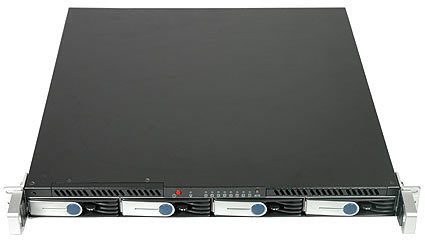Acard's Small Business RAID Appliance
Conclusion
Acard's ARS-3031 made a good impression, especially when you consider the device is in the sub-$1,000 price range. The hard drive frames are solid, and even inexperienced users can configure the system. Thanks to an external Ultra160 SCSI interface, the ARS-3031 can be hooked up to virtually any server or workstation host system using LVD cabling. Several of these appliances can also be SCSI-daisy-chained, which is not possible with eSATA appliances.
We found the RAID monitor software to be more of a cosmetic add-on, because it does not provide any real value that exceeds very basic drive monitoring. There is an event log to track status changes, but the system won't notify you by email in case one of the drives should fail.
The benchmark results are not close enough to what we expected prior to the testing. The IO benchmark graphs are flat rather than rising as the command queue depth increases, which indicates a bottleneck - whether this originated in the RAID controller's cache or was caused by the UltraSCSI-to-SATA bridge. As a result, the ARS-3031 delivers only 50% of the performance level that can be achieved by installing a current SATA RAID controller and four drives into existing server systems.
We do not recommend this product for application scenarios that require high storage performance due to its somewhat disappointing benchmark results. However, flexibility often is more important than performance, which is why we can still recommend the Areca appliance. Many rackmount servers cannot be upgraded by installing hard drives due to space constraints. As a result, the ARS-3031 can be called a viable solution for upgrading storage to existing SCSI infrastructures.
Get Tom's Hardware's best news and in-depth reviews, straight to your inbox.

Patrick Schmid was the editor-in-chief for Tom's Hardware from 2005 to 2006. He wrote numerous articles on a wide range of hardware topics, including storage, CPUs, and system builds.
